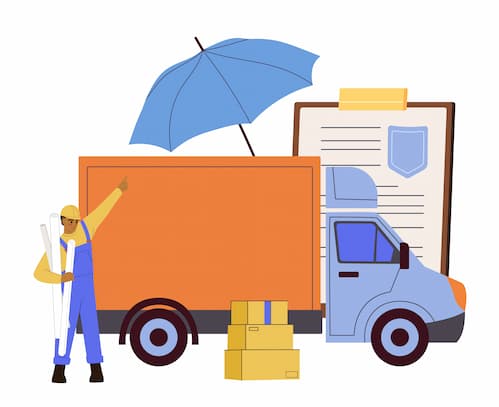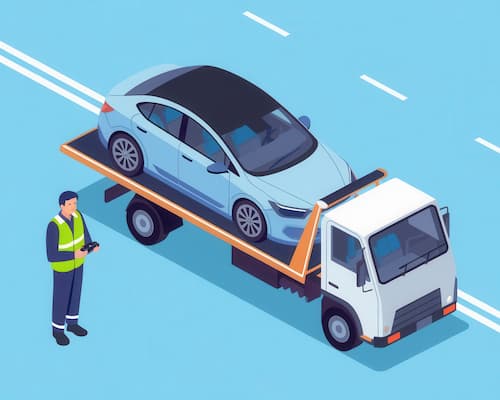What are the recommended coverage limits?
The best way to know which coverage limits are best for your business is to work with an experienced commercial insurance agent. They can assess your company’s needs and risk exposure and recommend the coverages and limits necessary to protect it.
That said, here is some general guidance to consider:
- Liability. Experts often recommend a minimum of $1 million in coverage.
- Physical damage. Comprehensive and collision insurance will typically cover your business vehicles up to their actual cash value (ACV). The more expensive your vehicles are to replace, the higher your premium will be.
- Optional coverage. Add-ons can vary by industry and insurance company. Consider what coverages and limits are available and what it would take to get back on the road after an incident. For example, if you add rental reimbursement, make sure you have enough coverage to rent a comparable vehicle so you’re not stuck while yours is being fixed. Hired and non-owned vehicle insurance (HNOA), which covers automobiles your business uses but doesn’t own, such as rental or employee-owned vehicles, can protect your company from lawsuits if someone is injured. It’s a good idea to match your liability limits if you add HNOA coverage.
“As an injury attorney, I've seen firsthand how inadequate commercial auto insurance can devastate a business,” Kimura says. “When a business vehicle is in an accident – whether a delivery truck, service truck, or ride-share vehicle – the potential liability can greatly exceed state minimums. I've represented clients injured by underinsured businesses, and the financial effect usually has an impact on both the injured victim and the business's future.”
Commercial auto insurance for a small business averages $147 per month, according to Insureon. However, premiums can vary significantly depending on the type of coverage, the limits, deductibles and other factors previously mentioned.

Commercial auto insurance costs an average of $147 per month, according to small business insurance broker Insureon.
What is commercial auto insurance coverage?
Commercial auto insurance covers vehicles used for business purposes. It protects businesses from financial losses from accidents, theft or damage involving company-owned or employee-driven vehicles.
Here’s a breakdown of what a commercial auto insurance policy typically covers:
- Liability. Covers injuries and property damage to others if you’re at fault in an accident.
- Collision. Pays for damage to your vehicle if you hit another object or vehicle.
- Comprehensive. Pays for damage from non-collision events like natural disasters, theft, animal damage and vandalism.
- Medical payments. Covers medical expenses for the driver of your vehicle and passengers if they get injured in an accident, regardless of fault.
- Personal injury protection (PIP). Can cover medical bills, lost wages, and other costs if you or your passengers are injured.
- Uninsured/underinsured motorist. Covers damage to your commercial vehicle if hit by someone who doesn’t have car insurance or enough liability coverage to pay for the damage.
You can customize your policy with optional add-ons to protect your small business. For example, you can include HNOA. You might also consider rental car coverage if you want to be reimbursed for the cost of a rental while your business vehicle is being fixed due to a covered claim.
Why you need commercial auto insurance
You probably need a commercial auto insurance policy if any of the following scenarios apply for your small business:
- Employees drive company cars or their personal vehicles for business purposes.
- You own or lease a fleet of vehicles.
- You use vehicles to transport goods or people for a fee.
- Your business owns a vehicle titled in the company’s name.
- You conduct services with your business vehicle.
- Your company vehicles have permanently attached equipment used for business purposes.
- You advertise your business on your personal vehicle.
How do you determine how much commercial auto insurance coverage you need?
Figuring out how much commercial auto insurance coverage you need involves evaluating several key aspects of your business, including:
Type of business
Your industry heavily influences your risk exposure. High-risk industries typically need higher liability limits and may need optional coverages to protect their company.
For instance, real estate agents are at lower risk because they primarily use vehicles for client meetings and to complete transitions. However, taxi or rideshare drivers have a higher liability exposure because they transport passengers. Construction and delivery are also high-risk industries due to frequent driving and heavy loads that can cause catastrophic damage in an accident.
Vehicle type and usage
The size, weight, vehicle purpose and usage matter when determining your coverage needs. Larger, heavier vehicles like tow trucks, dump trucks and semi-trucks can cause significantly more damage in accidents, which creates a higher liability exposure for the business. You can offset that by choosing higher liability limits to protect your company's finances and put more risk on the insurance company.
You might also need specialized coverage if your vehicles have permanently attached equipment like refrigeration, lift gates and tow rigs. If you have tools and equipment that aren’t attached, then consider inland marine or “tools in transit” coverage in case they get stolen from your vehicle. You may need cargo insurance if you carry high-value goods and higher liability limits if those goods are hazardous materials.
The more often your vehicles are used and the more miles you drive, the greater your exposure to an accident or other loss.
Consider all these factors when determining your coverage needs.
Business size and assets
Larger businesses with more assets at stake need more protection than smaller businesses with fewer assets.
“The bigger the size of a company, the more the extent of protection required against potential legal actions,” Kimura says.
Liability coverage helps protect your company’s assets if your business is sued after an accident. The more you have to lose, the more coverage you need.
So-called “nuclear” verdicts, which are jury awards of more than $10 million, are becoming more common, largely due to social inflation, or people’s opinions that businesses need to take on more accountability. Of the 1,288 nuclear verdicts the U.S. Institute for Legal Reform analyzed from 2013 to 2022, the second most frequent cases were for auto accidents (23.2%). According to the 2024 study, commercial auto accidents involving tractor-trailers are the most likely to result in a nuclear verdict if the case goes to trial.
Contractual requirements
You should review your contracts and vendor agreements carefully for insurance minimums before choosing a commercial auto policy. Some contracts require specific coverage types and limits, such as:
- Leasing equipment or vehicles
- Partnering with large corporations
- Working with government agencies
Common mistakes to avoid while choosing the coverage
Here are some common mistakes to avoid while choosing commercial auto insurance coverage:
- Buying personal auto insurance for business use. Personal auto insurance usually doesn’t cover driving for business purposes. If you use your vehicle for work, talk with your insurance agent to determine which policy type is right for you.
- Underestimating liability coverage. State minimum requirements may be all you need to drive legally, but not having enough liability insurance could leave you on the hook financially in an accident or lawsuit.
- Not including all drivers and vehicles on your policy. Failing to list all drivers – even occasional ones – and vehicles could result in claim denials.
- Not getting hired and non-owned auto insurance. HNOA can protect your business if employees use their cars or you rent vehicles for work. If you don’t have HNOA and an employee causes an accident, the injured party can sue the driver and your company since they were driving for business purposes.
- Not reviewing contracts or legal requirements. You could lose out on a lucrative contract or breach a legal agreement if you don’t comply with specific coverage types and limit requirements.
- Failing to reassess your coverage annually. Review your policy once a year or whenever you add new services, vehicles or drivers to ensure your coverage is still sufficient.
How to get the right commercial auto insurance coverage
Use this step-by-step guide to ensure you get the right commercial auto insurance coverage:
- Assess your business needs. Ask yourself what types of vehicles you have, who is driving them, how often and how far they are driven and what you’re transporting. Create a list of drivers, vehicles and usage patterns to help guide your coverage decisions.
- Identify coverage needs. Use your business profile – with the help of your insurance agent – to determine what coverages are essential, optional and nice to have.
- Choose appropriate coverage limits. Match your coverage limits with your business’s risk exposure and the value of your vehicles and attached equipment. Consider commercial umbrella insurance if you need extra liability protection.
- Compare insurance companies. Coverage options and rates vary by company. Compare at least three insurance companies to find the policy that best meets your needs, limits your exposure and fits within your budget. While price is important, consider each carrier’s commercial claims process and customer service reputation to help narrow your choices.
- Review the policy details carefully. Read the fine print, check for exclusions, confirm all drivers and vehicles are listed and that your coverage limits meet contractual requirements.
- Purchase the policy. Once you’ve found the right policy, make a payment to secure the coverage and get your proof of insurance and ID cards for all vehicles.
- Review and update your policy regularly. Your coverage may change along with your business. Review it at least once a year and whenever you need to add or remove vehicles or drivers and expand your services or service area.

What our expert says
FAQs
How much is commercial auto insurance per month?
Commercial auto insurance costs small businesses an average of $147 per month, according to commercial insurance brokerage Insureon. But premiums can vary significantly based on factors like the type of coverage you choose, the limits and deductibles, the number of vehicles and drivers you have, your industry, employee driving records and your company's claims history.
How much liability insurance do I need for a delivery business?
Delivery businesses usually spend a lot of time on the road servicing their customers. The more time you spend driving, the more likely you are to get into an accident. Delivery drivers should have at least $1 million in liability insurance to cover injuries, damage and potential lawsuits.
Is commercial auto insurance required by law?
Almost all states require auto insurance, whether it’s for a personal or business vehicle. Personal car insurance policies don’t typically cover driving for business use, so a commercial auto insurance policy is the best way to protect your assets and meet your state’s minimum coverage requirements.
Is commercial insurance expensive?
The riskier your business is and the more likely you are to file a claim, the more you’ll pay for commercial insurance. Other factors contribute to more expensive commercial auto insurance premiums, including higher vehicle repair expenses due to inflation, the rising cost of healthcare and a greater risk of accidents due to distracted driving. Medical expenses are expected to increase by 8% in 2025, according to the Health Research Institute (HRI), a part of PwC, one of the nation’s largest accounting firms. In the 2023 Travelers Risk Index, 30% of employees admit to being involved in an accident due to distracted driving, an increase of 19% from the prior year.






